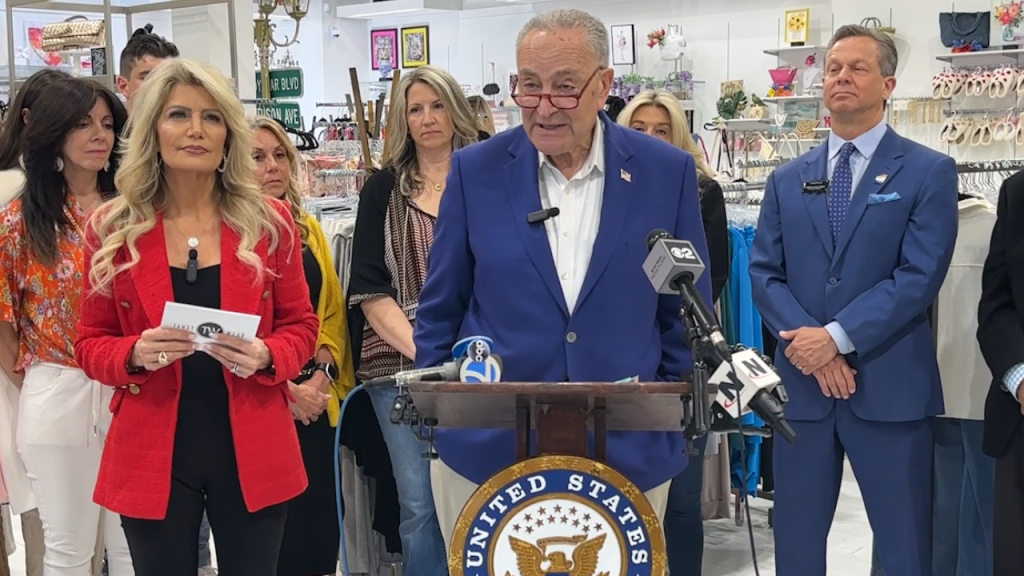Senate Minority Leader Chuck Schumer held a press conference on Long Island this past Thursday, where he voiced concerns over President Donald Trump‘s tariff agenda, standing alongside local business owner Tandy Jeckel. Jeckel, who operates a women’s clothing shop and identifies as a supporter of Trump, expressed how tariffs have negatively impacted both her business and consumer behavior. During the event, Schumer announced plans for a vote aimed at terminating the trade policies he claims are threatening jobs in Long Island and beyond.
| Article Subheadings |
|---|
| 1) Schumer’s Stand on Tariffs |
| 2) Business Impact from Tariffs |
| 3) Political Dynamics in Long Island |
| 4) The Legislative Response |
| 5) Responses from the White House |
Schumer’s Stand on Tariffs
During the press conference, Chuck Schumer articulated his frustrations regarding President Trump’s tariff policies, labeling them as counterproductive for both consumers and businesses. “No matter what your vantage, if you’re a business, if you are a consumer, if you are in the industry, the tariffs are one giant mess,” he stated emphatically. Schumer’s choice to highlight these concerns in a location known for its mixed political allegiances underscored the urgency of the situation he perceives.
Business Impact from Tariffs
The primary speaker alongside Schumer, Tandy Jeckel, owner of TandyWear—a women’s clothing shop in Suffolk County—expressed her concern about the uncertainty created by the tariffs. Jeckel is noted for being a split-ticket voter and has often supported Trump, yet the tariffs initiated by his administration have left her grappling with financial constraints. In her words, “With the tariffs, that’s my only issue… because I have a small business. So it’s not really political, it’s just something that this has to be rectified for our small business.” Jeckel’s situation illuminates the profound economic ramifications that tariffs can enact on small business owners, who operate in an already competitive environment.
Political Dynamics in Long Island
Long Island presents a unique political landscape within New York, having historically leaned Republican, particularly in its eastern regions. This constituency creates a dynamic where local lawmakers can have significant influence over policy discussions. Schumer took this opportunity to rally support, suggesting that Long Island lawmakers could play an essential role in pressuring their Republican counterparts to address these trade concerns. He cited alarming statistics indicating that Nassau County might lose nearly 11,000 jobs and Suffolk County about 24,000 jobs should these tariffs continue unchecked.
The Legislative Response
Addressing the pressing need for legislative action, Schumer announced his intention to push for a vote to end what he described as
Trump’s trade war.
This initiative is part of a broader effort aimed at mitigating the negative impacts of tariffs, not just in Long Island, but across New York State. He emphasized that cities like Syracuse and Albany are facing similar challenges to Long Island, reflecting a statewide issue rather than a localized incident. Schumer’s new proposal garnered the support of several Democratic senators, including Elizabeth Warren, Ron Wyden, and others, highlighting a united front among Democrats against the tariffs initiated by the Trump administration.
Responses from the White House
In response to Schumer’s allegations and proposed legislation, a spokesman for the White House accused him of not being honest regarding past critiques of America’s trade practices. The spokesman claimed that Schumer had previously expressed concerns about the nation’s trade deficits with countries like China before Trump took action.
“[He] railed against America’s historic and persistent trade deficits with China for years until President Trump took historic action to actually do something about China’s unfair trade practices and cheating,”
the spokesman stated. This defensive posture from the White House illustrates the political tension and ongoing debates surrounding tariff policies and their broader implications on American commerce.
| No. | Key Points |
|---|---|
| 1 | Senate Minority Leader Chuck Schumer criticized President Trump‘s tariff policies during a press conference on Long Island. |
| 2 | Local business owner Tandy Jeckel shared her struggles and uncertainty caused by tariffs, despite her support for Trump. |
| 3 | Long Island has a unique political landscape, with Schumer appealing to both Republican and Democratic constituents to address the tariff issues. |
| 4 | Schumer announced plans to vote to end tariffs and indicated potential job losses in Nassau and Suffolk counties if tariffs are maintained. |
| 5 | The White House defended Trump’s actions, accusing Schumer of political misrepresentation regarding past trade practices. |
Summary
The recent press conference led by Senate Minority Leader Chuck Schumer highlighted significant concerns over President Trump‘s tariff policies and their impact on local economies, particularly for small business owners like Tandy Jeckel. As discussions unfold regarding legislative action to mitigate these tariffs, it becomes evident that the economic repercussions are far-reaching, prompting a call for bipartisan efforts to address the challenges faced by communities across New York State. Schumer’s call to action reflects a growing sentiment among both parties regarding the necessity of reassessing America’s trade strategies to support local economies.
Frequently Asked Questions
Question: What are tariffs?
Tariffs are taxes imposed by a government on imported goods, which can affect the pricing of products and consumer behavior.
Question: Why are small businesses affected by tariffs?
Small businesses often rely on affordable imported goods. Tariffs can increase their operational costs, leading to higher prices for consumers and reduced sales.
Question: How is the current political landscape influencing tariffs?
The political landscape plays a crucial role in shaping trade policies, as elected officials may work across party lines to address economic challenges posed by tariffs, illustrating the need for a bipartisan approach.


